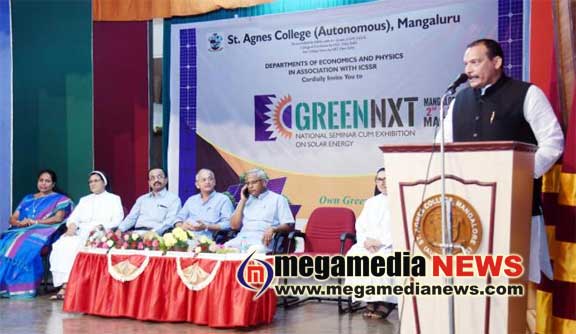‘Awareness is key to solar adoption in DK’
10:56 AM, Tuesday, March 6th, 2018 Mangaluru: Dakshina Kannada district is at the second position in the generation of solar energy next to Bengaluru,” said chief whip of the Legislative Council, Ivan D’Souza.
Mangaluru: Dakshina Kannada district is at the second position in the generation of solar energy next to Bengaluru,” said chief whip of the Legislative Council, Ivan D’Souza.
He was speaking at Greennxt, a national level seminar and exhibition on solar energy, organised by the St Agnes College. “There is a need to harness solar energy. A campaign has been initiated in the district. The use of solar energy helps in reducing dependence on non-renewable sources of energy and conservation of the environment.”
MLC Capt Ganesh Karnik said, “There is a need to create awareness about solar energy. A country that enjoys unlimited sunlight throughout the year can use this energy to spread its power and benefits to remote corners. The advantage of solar energy is that it is clean, renewable and virtually inexhaustible.”
At the exhibition, the solar water pump was used to demonstrate how solar energy can be used in irrigation and housing societies to provide water with zero electricity bills.
According to Ronald I Gomes, MD, Sunray Solar Systems, the solar system can power water pumps from 1 HP up to 75 HP, depending on the requirement. “There are so many remote places in Karnataka, where electricity is still a fortunate thing to have.
With solar water pumps, farmers can not only be energy independent but also do away with the pollution that diesel-powered pumps create. The solar pump demonstrated here is not installed anywhere in DK.”
He noted that the system can be a viable alternative to high power water motors that generate huge electricity bills for institutions like schools, hospitals, and apartment buildings. However, there is a need for further awareness among general consumers and organisations about the financial and energy benefits that solar systems can bring in.
With the growing industrialisation and residential building expansions, there is a huge demand for power in the DK district. Mescom buys over 5500 million units per annum to supply electricity to its ever-growing consumer base.
Solar adoption by people in the district can mean that MESCOM will have self-sufficiency in energy supply and its consumers will gain the benefit.
John D’Silva, an industrialist from Karkala, said, “I have installed a 23KW solar unit at my complex, which cost me a decent amount of money, but banks provide you over 90% loan if you wish to install a solar system at your home. MESCOM pays me over Rs 4 Lakh per year for the surplus electricity I supply to them.”
Simillar Posts
Warning: count(): Parameter must be an array or an object that implements Countable in /home/megamcaq/public_html/wp-content/plugins/post-plugin-library/common_functions.php on line 357
- None Found
Leave a Reply
© Copyright 2008 www.megamedianews.com All Rights Reserved. Privacy Policy








 Posted in
Posted in  Tags:
Tags: 






